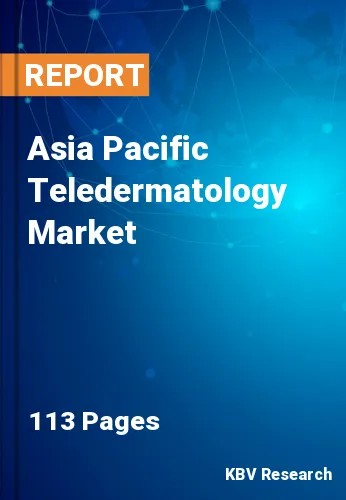The Asia Pacific Teledermatology Market would witness market growth of 16.3% CAGR during the forecast period (2023-2030).
Health Care Management (mobile applications enabling teledermatology are gaining importance in the domain), Education (several universities provide online courses and training programs suitable for medical students), and particular interest domains like teledermoscopy, teledermatopathology, dermatopathology supported by teledermatology, and mobile teledermatology are all applicable to teledermatology.
Teledermatology has been reported to increase patient satisfaction and diagnostic concordance. Teledermatology may be an efficient triage aid, reducing referral delays (even in cutaneous malignancies combined with teledermoscopy). Teledermatology has demonstrated utility in monitoring chronic skin diseases, such as chronic ulcers. These factors are anticipated to stimulate the market.
Teledermatology is gaining traction due to the increasing acceptance and acceptance of telehealth platforms and solutions. Telehealth is transforming the appearance of every sector of the healthcare industry. Dermatology is a type of study and research that aids in treating and diagnosing skin-related conditions. Skin-related issues can affect individuals of all ages. This creates a demand for teledermatology on the regional market. Moreover, they find it more convenient to communicate their concerns through teledermatology platforms than to visit a doctor in person. Due to these factors, the market is anticipated to expand in the coming years.
China is leading in the healthcare industry due to its massive investments in big data, AI, and other IT-related funds. In its response to Covid-19, Japan has experientially highlighted the advantages of digital. It has explicitly focused on telemedicine. In the coming years, rising investments in the telecommunications network and the expansion of healthcare infrastructure are anticipated to stimulate regional growth. People in the APAC region are more concerned with their appearance and thus consult dermatologists for their skin health. In addition, the escalating incidence of various skin conditions has been exacerbated by the escalating rate of environmental change, further increasing the need for consultation. This, along with the factors above, has led to the expansion of the APAC market.
The China market dominated the Asia Pacific Teledermatology Market by Country in 2022, and would continue to be a dominant market till 2030; thereby, achieving a market value of $1,949.2 million by 2030. The Japan market is registering a CAGR of 15.5% during (2023 - 2030). Additionally, The India market would showcase a CAGR of 17% during (2023 - 2030).
Based on Type, the market is segmented into Services and Product. Based on Services Type, the market is segmented into Teleconsultation, Telemonitoring and Tele-education. Based on Modality, the market is segmented into Store-and-forward (Asynchronous) and Real-time (Synchronous). Based on End User, the market is segmented into Homecare and Healthcare Units. Based on countries, the market is segmented into China, Japan, India, South Korea, Singapore, Malaysia, and Rest of Asia Pacific.
Free Valuable Insights: The Worldwide Teledermatology Market is Projected to reach USD 27.7 Billion by 2030, at a CAGR of 15.2%
The market research report covers the analysis of key stake holders of the market. Key companies profiled in the report include Ksyos, MetaOptima Technology, Inc., Veradigm, Inc., McKesson Corporation, Teladoc Health, Inc., FirstDerm, 3M Company (3M Health Information Systems), Siemens Healthineers AG (Siemens AG), DermUtopia and Digital Diagnostics, Inc. (3Derm Systems, Inc.).
By Type
By Modality
By End User
By Country
Our team of dedicated experts can provide you with attractive expansion opportunities for your business.

